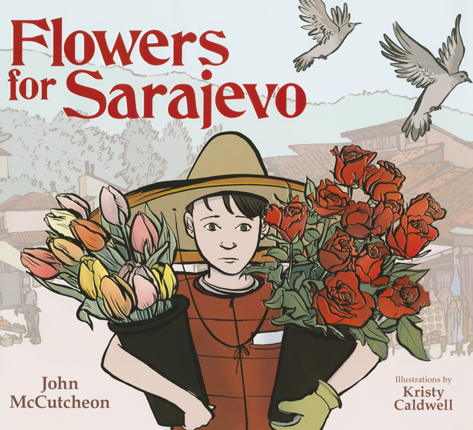| Flowers for Sarajevo Author: McCutcheon, John | ||
| Price: $6.50 | ||
Summary:
In 1992, a young boy whose father is away at war discovers, from their flower stall, the power of beauty and kindness in the wake of the bombing of Sarajevo.
| Illustrator: | Caldwell, Kristy |
| Accelerated Reader Information: Interest Level: LG Reading Level: 3.40 Points: .5 Quiz: 187923 | Reading Counts Information: Interest Level: K-2 Reading Level: 3.30 Points: 3.0 Quiz: 72418 | |
Reviews:
Kirkus Reviews (+) (02/01/17)
School Library Journal (+) (00/04/17)
Booklist (02/01/17)
The Bulletin of the Center for Children's Books (00/03/17)
Full Text Reviews:
Booklist - 02/01/2017 After Drasko’s father is sent away to war, it’s up to him to sell flowers from their stand in the Sarajevo market. The tense mood pervading the city makes it hard to be optimistic or kind, especially after a bomb kills 22 people in the market. But a cellist’s simple, defiant act of beauty inspires Drasko to find a shred of hope. Based on a real-life event after a notorious bombing in Sarajevo, McCutcheon’s moving picture book follows Drasko as he copes with his father’s absence and watches the cellist, Vedran Smailovic, play a mournful adagio every day for 22 days. Caldwell’s thick-outlined figures are deeply expressive, and her treatment of the bombing is appropriately scary but never gruesome. The lengthy text might make this better suited to the older end of the picture-book set, and it will surely raise some questions, but an author’s note briefly explaining the Bosnian conflict offers some context. An included audio CD (unavailable for review) contains a performance by Smailovic. A bittersweet account of the power of art in dark times. - Copyright 2017 Booklist.
School Library Journal - 04/01/2017 Gr 2–5—Based on a true story, this picture book relates an uplifting tale of how music can help people rise above the horror of war. Twenty-five years ago, civil war raged in Sarajevo. A young boy, Drasko, helps his father sell flowers in the market square. He watches as his father speaks to everyone, regardless of ethnicity or religion, in a country where civil war has pitted various cultures against one another. When his father leaves to join the fighting, Drasko continues at the flower stand. In the square, as people wait in line at the bakery for bread, a bomb is dropped, and 22 people are killed. The next day, and for the following 22 days, a tuxedoed cellist appears in the square and plays music to honor the dead. McCutcheon tells the story through the eyes of young Drasko, who realizes how the beauty of this unexpected music inspires feelings of hope that help to counter the sorrows of war. In response to the music, Drasko does not sell his flowers but gives them away: "Today they are free." Caldwell has framed the central actions of the story and the faces in the crowded market square in beautiful, rich colors against the somewhat faded and blurred background. The flowers, a symbol of hope, are prominently displayed. The classical setting of the architecture of the square deftly contrasts with the upheaval of a society at war, as depicted by the crater left from the bombing. Text and illustrations work together to remind readers of the power of beauty in the face of human suffering. Appended are historical notes. A CD includes an audio version of the tale, narrated by the author, and a musical performance by the story's cellist. VERDICT A highly recommended book that highlights the capacity for empathy and humanity, even in a society faced with violence and war.—Carole Phillips, Greenacres Elementary School, Scarsdale, NY - Copyright 2017 Publishers Weekly, Library Journal and/or School Library Journal used with permission.



